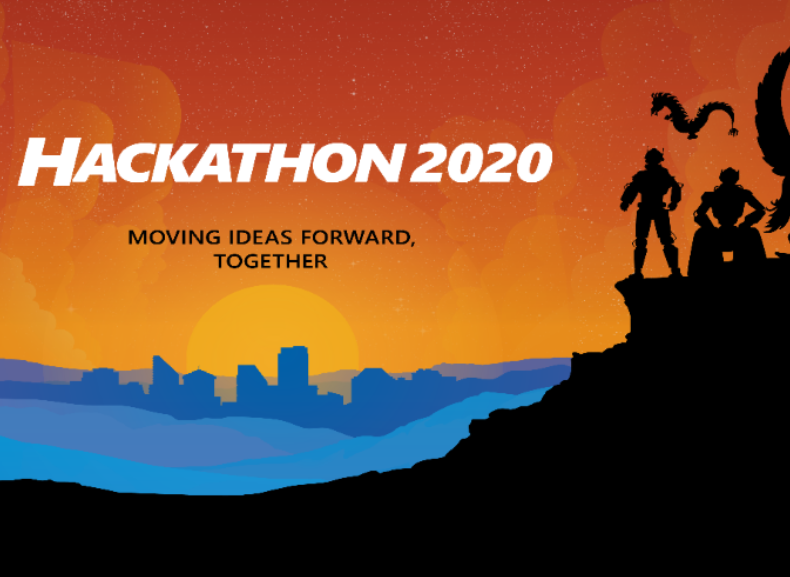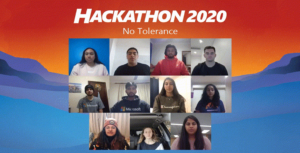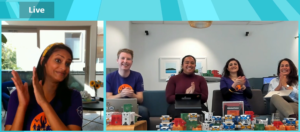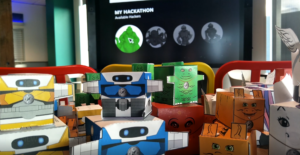What is a Hackathon? The answer is the collective power of minds, creativity, compassion, and technology to solve big problems.
This was on full display last week at Microsoft as employees in New Zealand, Australia, and around the world participated in the largest private Hackathon on the planet.
Nearly 34,000 participants in 19 global time zones, 996 cities, and 82 countries got together and worked on 5,202 projects.
“Getting to play even a small part of the Hackathon was simply amazing. The creativity, the way Microsoft employees came together, and the incredible solutions these teams developed in just 72 hours just blew me away. The Hackathon was a powerful example of our mission to empower every person and organisation on the planet to achieve more. ” – said Vanessa Sorenson, Managing Director of Microsoft New Zealand and one of the local judges of the Hackathon.
This year in New Zealand, teams focused on 4 projects working on 4 different challenges with local and international hackers. The teams had three days to define, refine, and suggest a creative solution to different problems ranging from water conservation to domestic violence to accessibility solutions to customer experience.
“Over 72 hours I saw teams rapidly ideate, code, and deploy purpose-built solutions with a focus on community and sustainability.– said Olaf Wrieden, Specialist Intern and Hackathon lead for New Zealand.
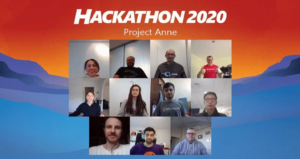 In NZ, much like other countries with growing population and the impact of climate change the demand for water is straining our infrastructure. So, one of the teams came up with a solution to help New Zealanders manage their water usage by collecting rainwater to reduce pressure on water supply. The team did this through a friendly chat bot they named Ann after one of their team members’ mum’s who had suggested the idea. They collected a wide range of open datasets and used Azure Maps, Applied AI & Machine learning to identify efficient rainwater collection approaches and cost benefit analysis.
In NZ, much like other countries with growing population and the impact of climate change the demand for water is straining our infrastructure. So, one of the teams came up with a solution to help New Zealanders manage their water usage by collecting rainwater to reduce pressure on water supply. The team did this through a friendly chat bot they named Ann after one of their team members’ mum’s who had suggested the idea. They collected a wide range of open datasets and used Azure Maps, Applied AI & Machine learning to identify efficient rainwater collection approaches and cost benefit analysis.
“We had a team of 7 nationalities in 3 different countries who brought diverse and complimentary viewpoints, skills and a truckload of passion for the future well-being of our families, friends, city, nation and planet and that’s why I think we were the right team to solve this problem” – Roseanne O’Hare, Account Delivery Executive and New Zealand chapter lead for Microsoft’s sustainability community.
1 in 3 women in New Zealand face domestic violence issues with police responding to family violence incidence every 4 minutes. During this year’s Hackathon, project No Tolerance got together, and leveraging PowerApps, created a disguised app that allows victims to take notes and store evidence, making it easier for them to later report back the issues to the responsible authorities.
Most of the members of team No Tolerance were Microsoft interns from different countries. “As an intern, the thought of taking part in a global Hackathon was terrifying but we overcame that when we realised that society’s need is greater than our fear!” said Ilaisaane Falevai specialist intern and one of the projects members in New Zealand.
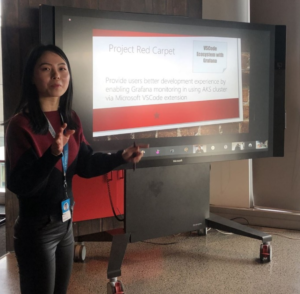 One of the biggest issues with bringing ideas to life is the complexity of technology which enables the solutions. This is what Project AKS focused on fixing during the Hackathon, a project to provide end users better development experience by experimenting and enabling open source monitoring tools using Azure Kubernetes Services cluster via Microsoft VSCode extension.
One of the biggest issues with bringing ideas to life is the complexity of technology which enables the solutions. This is what Project AKS focused on fixing during the Hackathon, a project to provide end users better development experience by experimenting and enabling open source monitoring tools using Azure Kubernetes Services cluster via Microsoft VSCode extension.
“It’s an amazing experience working with colleagues from different parts of this organisation to help solve customers’ technical challenges.”– said Myra Ma, Cloud Solution Architect at Microsoft and project lead for the initiative.
Right now, thousands New Zealanders live with blindness and low vision. For this group, access to the digital world is limited and often problematic.
What if there was a way to quickly find out what resources c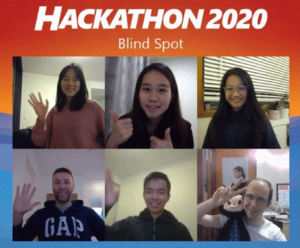 ould help navigate both the digital and physical world?
ould help navigate both the digital and physical world?
Another creative Hackathon team came up with project BlindSpot, a crowd-sourced chat-bot for accessible applications to help support the low vision community. A demo product was built during the Hackathon using QandA Maker chatbot and the team hopes to continue to develop the solution to empower users by using the Microsoft Azure platform.
The success of a Hackathon is often defined by what comes next. Incredibly, each of the innovative Hackathon projects in New Zealand this year have received support for continued development to help address these important issues.
“I describe Hackathons as a problem-solving pressure cooker. I have participated and organised many Hackathons during my career. At Microsoft the difference is that our strong technology platform makes what would otherwise be ‘blue sky thinking ideal end state’ a ‘feasible, easy to implement in the short term’ concept. I can’t wait to see all the solutions come to life!” – said Saba Samiei partner development manager and Hackathon 2020 New Zealand co-lead.

